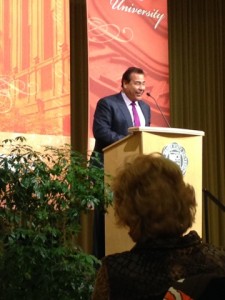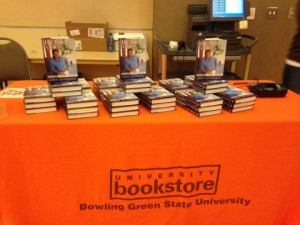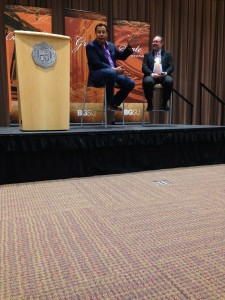Quiñones Inspires Staff and Students
On Wednesday Jan. 29 award winning journalist and host of ABC’s hit show “What would you do?”, John Quinones spoke to a crowd of students and faculty in honor of the legacy left by Martin Luther King Jr. The speech took place in the Bowen-Thompson Student Union Lenhart Grand Ballroom. Quiñones spoke for almost an hour, after which he fielded questions from students and faculty members. Providing advice and words of encouragement to young, aspiring journalists, detailed accounts of his experiences in the field, and speaking quite candidly about his youth and some of the adversity he faced because he is Latino. Quiñones signed books for audience members as well. Thursday morning Jan 30, Quiñones also held a separate but intimate Q-and-A where he answered more questions from students and faculty.
ABC’s “What Would You Do?” depicts potential dangers lurking during spring break for college students.
Questionnaire from \”What Would You Do?\”
Quiñones on Perseverance and Coping with Racial Adversity
During the January 29 visit from the guest speaker, John Quiñones, there was a time made available after his speech for audience members to ask questions. Our group was fortunate enough to have the opportunity to ask a couple of questions.
The first question asked to Mr. Quiñones was “Has there ever been a time in your career that you feel you took the job a bit too far?” He then told us about a story he and his team attempted to cover in the southern region of North America in 1989. There had been an upheaval of one of the governments and the boarders had been closed to the all outside journalists. Quiñones and his team believed that they would be able to slip through the boarder to cover the event. The team had decided not to enter the country unless all four members agreed, which they did.
The team was able to basically lie and fake their way into the country without using their visas. When they got into the country, they found a hotel and hid inside. The ruler of the country, however, had discovered that multiple reporters from different countries had invaded the boarders and decided to take action. The ruler invaded the hotel and had 40 journalists taken hostage. One of the 40 journalists taken hostage was a producer from John Quiñones’ team.
Although all of the hostages were released about 36 hours later, the experience was bad enough that Mr. Quiñones felt that he had gone too far for the story. Luckily, none of the journalists were harmed while they were kept hostage.
Involvement with “What Would You Do?”
Another question asked by our team to Mr. Quiñones was “Which episode of ‘What Would You Do?’ had the greatest influence upon you personally?” Mr. Quiñones described an episode based on a law that had recently passed in Arizona stating that Mexican citizens found in the U.S. without proper paperwork could be deported immediately. The scene that they set was in a restaurant in Arizona; a man was attempting to call the police on Mexican citizen. Mr. Quiñones even disguised himself and played the part of the Mexican citizen that was being persecuted. It was surprising to him, despite the fact that they were filming in the state that had recently passed the law that so many people jumped to his defense to keep the other actor from dragging the Mr. Quiñones off to the authorities.
Q&A
Thursday morning John Quiñones hosted a Q&A event open to students and the public. The attendance for this event was smaller than that of the speech Wednesday evening, creating an intimate event where many students stood up to ask Quiñones questions about his career, tips for potential journalists, insights into the changing industry, and many other topics. Early on, he recited a quote he heard from someone early on in his career:
“Don’t talk to the movers and shakers, talk to the moved and the shaken.”
Through the answers Quiñones provided during this Q&A, it was made clear that he has taken that advice to heart throughout his carer. He discussed how each one of us can use our unique backgrounds to our advantage in reporting— such as when he was sent to cover the 2010 Chilean miners’ rescue: being bilingual in Spanish and English allowed him to speak with the miners first, while the other American reporters were left in the cold. He discussed the need for potential journalists to have “A burning desire to illuminate and change the world” and stressed the need to make connections with those who had suffered. He spoke of how he has covered the plight of Latin American immigrants to America and the problems they have, many of which he shared a similar upbringing. He also spoke about the state of the industry and urged potential journalists not to be discouraged by what people say: while news is being covered more and more in the digital world, sites such as Twitter allow news to be covered faster and from a variety of angles. Ultimately, the world will always need storytellers, he said.
One question asked to Mr. Quiñones about where he is now as a journalist and writer stood out from the rest. The question, asked by an art major, was whether or not Mr. Quiñones has his eye on a certain prize and if he didn’t, how does he view contentment. Mr. Quiñones’ answer, in our opinion, was fantastic.
He started replying that every time he did a story, it brought him satisfaction. Once Quiñones has completed a story, he begins to question certain aspects of it.
“I didn’t say enough,”
“It could have been better,”
“We should have had more time.”
These are all things that John Quiñones says to himself every time he watches one of his segments or shows. Quiñones discusses his last story that gave him great satisfaction and contentment, which was about dwarfs in Ecuador. These dwarfs agreed to get studied because the gene that makes them ‘small’ is also a gene that prevents them from obtaining diabetes and cancer just so they could help out fellow humans.
The main contentment that Mr. Quiñones has is his 3 children, ages 28, 22, and 19, all of whom are involved in some form of media. Quiñones praises his children and all of their abilities and goes on to say how great it is to have all of them in New York, where he also resides.
John Quiñones wraps up his answer by explaining that we should all use our hidden talents to tell a story. He ends his answer saying, “Fight the good fight!”
In conclusion, John Quiñones was a motivating speaker and BGSU students were very lucky to have gotten the chance to learn from his experiences. It doesn’t matter if the person listening was majoring in journalism, nursing, education or bio engineering. If there is anything the people attending should take from the experience, he told everyone…
“No matter how tough things get for you, if you keep your eyes on the prize, you will get there.”



